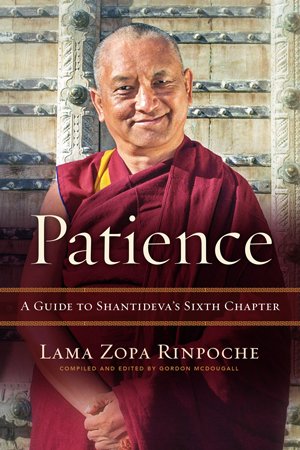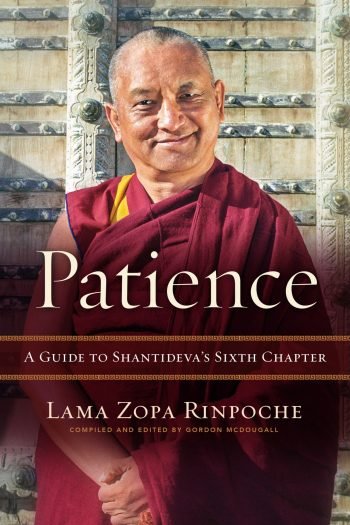- Home
- FPMT Homepage
Foundation for the Preservation of the Mahayana Tradition
The FPMT is an organization devoted to preserving and spreading Mahayana Buddhism worldwide by creating opportunities to listen, reflect, meditate, practice and actualize the unmistaken teachings of the Buddha and based on that experience spreading the Dharma to sentient beings. We provide integrated education through which people’s minds and hearts can be transformed into their highest potential for the benefit of others, inspired by an attitude of universal responsibility and service. We are committed to creating harmonious environments and helping all beings develop their full potential of infinite wisdom and compassion. Our organization is based on the Buddhist tradition of Lama Tsongkhapa of Tibet as taught to us by our founders Lama Thubten Yeshe and Lama Thubten Zopa Rinpoche.
- Willkommen
Die Stiftung zur Erhaltung der Mahayana Tradition (FPMT) ist eine Organisation, die sich weltweit für die Erhaltung und Verbreitung des Mahayana-Buddhismus einsetzt, indem sie Möglichkeiten schafft, den makellosen Lehren des Buddha zuzuhören, über sie zur reflektieren und zu meditieren und auf der Grundlage dieser Erfahrung das Dharma unter den Lebewesen zu verbreiten.
Wir bieten integrierte Schulungswege an, durch denen der Geist und das Herz der Menschen in ihr höchstes Potential verwandelt werden zum Wohl der anderen – inspiriert durch eine Haltung der universellen Verantwortung und dem Wunsch zu dienen. Wir haben uns verpflichtet, harmonische Umgebungen zu schaffen und allen Wesen zu helfen, ihr volles Potenzial unendlicher Weisheit und grenzenlosen Mitgefühls zu verwirklichen.
Unsere Organisation basiert auf der buddhistischen Tradition von Lama Tsongkhapa von Tibet, so wie sie uns von unseren Gründern Lama Thubten Yeshe und Lama Thubten Zopa Rinpoche gelehrt wird.
- Bienvenidos
La Fundación para la preservación de la tradición Mahayana (FPMT) es una organización que se dedica a preservar y difundir el budismo Mahayana en todo el mundo, creando oportunidades para escuchar, reflexionar, meditar, practicar y actualizar las enseñanzas inconfundibles de Buda y en base a esa experiencia difundir el Dharma a los seres.
Proporcionamos una educación integrada a través de la cual las mentes y los corazones de las personas se pueden transformar en su mayor potencial para el beneficio de los demás, inspirados por una actitud de responsabilidad y servicio universales. Estamos comprometidos a crear ambientes armoniosos y ayudar a todos los seres a desarrollar todo su potencial de infinita sabiduría y compasión.
Nuestra organización se basa en la tradición budista de Lama Tsongkhapa del Tíbet como nos lo enseñaron nuestros fundadores Lama Thubten Yeshe y Lama Zopa Rinpoche.
A continuación puede ver una lista de los centros y sus páginas web en su lengua preferida.
- Bienvenue
L’organisation de la FPMT a pour vocation la préservation et la diffusion du bouddhisme du mahayana dans le monde entier. Elle offre l’opportunité d’écouter, de réfléchir, de méditer, de pratiquer et de réaliser les enseignements excellents du Bouddha, pour ensuite transmettre le Dharma à tous les êtres. Nous proposons une formation intégrée grâce à laquelle le cœur et l’esprit de chacun peuvent accomplir leur potentiel le plus élevé pour le bien d’autrui, inspirés par le sens du service et une responsabilité universelle. Nous nous engageons à créer un environnement harmonieux et à aider tous les êtres à épanouir leur potentiel illimité de compassion et de sagesse. Notre organisation s’appuie sur la tradition guéloukpa de Lama Tsongkhapa du Tibet, telle qu’elle a été enseignée par nos fondateurs Lama Thoubtèn Yéshé et Lama Zopa Rinpoché.
Visitez le site de notre Editions Mahayana pour les traductions, conseils et nouvelles du Bureau international en français.
Voici une liste de centres et de leurs sites dans votre langue préférée
- Benvenuto
L’FPMT è un organizzazione il cui scopo è preservare e diffondere il Buddhismo Mahayana nel mondo, creando occasioni di ascolto, riflessione, meditazione e pratica dei perfetti insegnamenti del Buddha, al fine di attualizzare e diffondere il Dharma fra tutti gli esseri senzienti.
Offriamo un’educazione integrata, che può trasformare la mente e i cuori delle persone nel loro massimo potenziale, per il beneficio di tutti gli esseri, ispirati da un’attitudine di responsabilità universale e di servizio.
Il nostro obiettivo è quello di creare contesti armoniosi e aiutare tutti gli esseri a sviluppare in modo completo le proprie potenzialità di infinita saggezza e compassione.
La nostra organizzazione si basa sulla tradizione buddhista di Lama Tsongkhapa del Tibet, così come ci è stata insegnata dai nostri fondatori Lama Thubten Yeshe e Lama Zopa Rinpoche.
Di seguito potete trovare un elenco dei centri e dei loro siti nella lingua da voi prescelta.
- 欢迎 / 歡迎
简体中文
“护持大乘法脉基金会”( 英文简称:FPMT。全名:Foundation for the Preservation of the Mahayana Tradition) 是一个致力于护持和弘扬大乘佛法的国际佛教组织。我们提供听闻,思维,禅修,修行和实证佛陀无误教法的机会,以便让一切众生都能够享受佛法的指引和滋润。
我们全力创造和谐融洽的环境, 为人们提供解行并重的完整佛法教育,以便启发内在的环宇悲心及责任心,并开发内心所蕴藏的巨大潜能 — 无限的智慧与悲心 — 以便利益和服务一切有情。
FPMT的创办人是图腾耶喜喇嘛和喇嘛梭巴仁波切。我们所修习的是由两位上师所教导的,西藏喀巴大师的佛法传承。
繁體中文
護持大乘法脈基金會”( 英文簡稱:FPMT。全名:Found
ation for the Preservation of the Mahayana Tradition ) 是一個致力於護持和弘揚大乘佛法的國際佛教組織。我們提供聽聞, 思維,禪修,修行和實證佛陀無誤教法的機會,以便讓一切眾生都能 夠享受佛法的指引和滋潤。 我們全力創造和諧融洽的環境,
為人們提供解行並重的完整佛法教育,以便啟發內在的環宇悲心及責 任心,並開發內心所蘊藏的巨大潛能 — 無限的智慧與悲心 – – 以便利益和服務一切有情。 FPMT的創辦人是圖騰耶喜喇嘛和喇嘛梭巴仁波切。
我們所修習的是由兩位上師所教導的,西藏喀巴大師的佛法傳承。 察看道场信息:
- FPMT Homepage
- News/Media
-
- Study & Practice
-
-
- About FPMT Education Services
- Latest News
- Programs
- New to Buddhism?
- Buddhist Mind Science: Activating Your Potential
- Heart Advice for Death and Dying
- Discovering Buddhism
- Living in the Path
- Exploring Buddhism
- FPMT Basic Program
- FPMT Masters Program
- FPMT In-Depth Meditation Training
- Maitripa College
- Lotsawa Rinchen Zangpo Translator Program
- Universal Education for Compassion & Wisdom
- Online Learning Center
-
- Prayers & Practice Materials
- Overview of Prayers & Practices
- Full Catalogue of Prayers & Practice Materials
- Explore Popular Topics
- Benefiting Animals
- Chenrezig Resources
- Death & Dying Resources
- Lama Chopa (Guru Puja)
- Lama Zopa Rinpoche: Compendium of Precious Instructions
- Lama Zopa Rinpoche: Life Practice Advice
- Lama Zopa Rinpoche Practice Series
- Lamrim Resources
- Mantras
- Prayer Book Updates
- Purification Practices
- Sutras
- Thought Transformation (Lojong)
- Audio Materials
- Dharma Dates - Tibetan Calendar
- Translation Services
- Publishing Services
- Ways to Offer Support
- Prayers & Practice Materials
-
- Teachings and Advice
- Find Teachings and Advice
- Lama Zopa Rinpoche Advice Page
- Lama Zopa Rinpoche: Compendium of Precious Instructions
- Lama Zopa Rinpoche Video Teachings
- ༧སྐྱབས་རྗེ་བཟོད་པ་རིན་པོ་ཆེ་མཆོག་ནས་སྩལ་བའི་བཀའ་སློབ་བརྙན་འཕྲིན།
- Podcasts
- Lama Yeshe Wisdom Archive
- Buddhism FAQ
- Dharma for Young People
- Resources on Holy Objects
- Teachings and Advice
-
-
*If a menu item has a submenu clicking once will expand the menu clicking twice will open the page.
-
-
- Centers
-
- Teachers
-
- Projects
-
-
-
-
*If a menu item has a submenu clicking once will expand the menu clicking twice will open the page.
-
-
- FPMT
-
-
-
-
-
Actions that give harm to other sentient beings aren’t those of a bodhisattva. In Buddhism, there’s no such thing as a holy war. You have to understand this. It’s impossible to equalize everybody on earth through force.
Lama Thubten Yeshe
-
-
-
- Shop
-
-
-
The Foundation Store is FPMT’s online shop and features a vast selection of Buddhist study and practice materials written or recommended by our lineage gurus. These items include homestudy programs, prayers and practices in PDF or eBook format, materials for children, and other resources to support practitioners.
Items displayed in the shop are made available for Dharma practice and educational purposes, and never for the purpose of profiting from their sale. Please read FPMT Foundation Store Policy Regarding Dharma Items for more information.
-
-
Advice from Lama Zopa Rinpoche
20
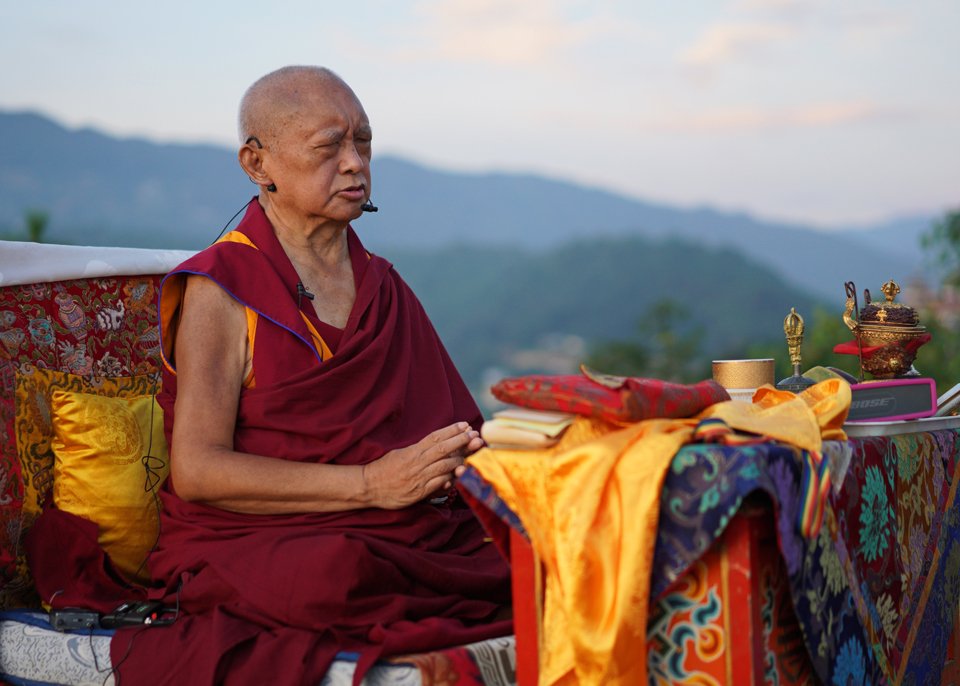
Rinpoche giving a teaching on chod practice, having also done a tea offering practice on the hill with senior Kopan monks, Kopan Monastery, Nepal, October 2020. Photo by Ven. Lobsang Sherab.
Lama Zopa Rinpoche continues his video teachings on thought transformation from Kopan Monastery in Nepal. Here is a summary of the most recent teaching:
Rinpoche begins this teaching reminding us that we will continue to suffer if we never make preparation for tomorrow’s happiness. Worldly people don’t see that—they only think of happiness now, only think of this life and don’t make preparation for the happiness of tomorrow, next month, next year, and certainly not for the next life. So the suffering continues.
When karma ripens, you must experience what you have created, no matter how much you don’t like it. This is why we have to be careful not to create negative causes and conditions. In order to avoid this, we have to practice Dharma. Not worldly Dharma, holy Dharma. Practicing Dharma doesn’t mean sitting on the meditation cushion or doing prayers all day long. It means renouncing this life. Even to be poor externally isn’t the main objective. It is to renounce attachment, the three poisonous minds, and the self-cherishing thought that is the root of samsara. This is renouncing where all the problems come from—all the attachment to this life, all the emotions. That is the first Dharma. If you don’t know how to practice Dharma, you won’t give up attachment to this life.
Even to achieve liberation from samsara forever is not the real meaning of human life. The real meaning of a human life is to abstain from harming sentient beings and only benefit them—to cause happiness and free the numberless sentient beings from the oceans of samsaric sufferings. To do this, you have to know what Dharma is.
Every day you have to remember to stop harming sentient beings. If they harm, don’t harm back. You only benefit and bring every sentient being to peerless happiness, the total cessation of gross and subtle obscurations, and completion of all realizations. To do this you need to achieve the state of omniscience. Therefore, you listen to the teachings.
Practicing lojong means you transform your suffering mind into a happy mind all the time.
You collect great merit by listening to teachings on emptiness, teaching emptiness to others, and meditating on emptiness. You also collect great merit by writing out and reading the Prajnaparamita. Rinpoche and others are writing out the Prajnaparamita in pure gold. Monks in the monasteries memorize the Prajnaparamita so they can easily bring Dharma to the world. It is very skillful to utilize the opportunity of holy merit-multiplying days by writing out and printing sutras.
Kyabje Kirti Tsenshab Rinpoche said the best practice is studying Prajnaparamita, Rinpoche explains. Then there are the middle preliminary practices of reading Gyetongpa one hundred times and the smaller nine preliminary practices of refuge, prostrations, Vajrasattva, mandala offerings, and so forth. Many people might think that studying and doing preliminary practice are separate—that studying is not really purifying the mind and collecting merits. So then you think the mandala offerings you do are separate. It is not like that. You have to recognize that by studying Prajnaparamita you are doing the best preliminary practice. You have to know that. Those who are studying the FPMT Education Basic Program and Masters Program have to know this.
Even if you doubt that things exist from their own side and think things might be empty—this already shakes your samsara. To have even a little faith in the teachings on emptiness is so fortunate. And if you have faith in the Diamond Cutter Sutra—wow! You collect more merit than making charity of your own body! By writing these texts, reading them, memorizing them, keeping them, and then of course actualizing the meaning and revealing to others—wow! Inconceivable merits. The place where you read these sutras becomes holy. It becomes like a stupa! Can you imagine those who memorize many texts on the teachings of emptiness? They can recite in the car, on top of Mount Everest, anywhere they are! Even memorizing one verse and teaching others—this is easy to do and creates so much merit. Even wishing to receive teachings on emptiness purifies negative karma. Just the wish to realize that nothing exists from its own side—this alone … inconceivable benefit. Just listening to the meaning of dependent-arising starts to liberate you from oceans of samsaric suffering. There is no question if you are writing, making offerings or prostrations to the text, or memorizing—unbelievable merits you collect. You purify the heavy negative karma and downfalls.
We invite you to go deeper into the topics presented here, plus many others, by watching Rinpoche’s video and reading the full transcript of Rinpoche’s teaching.
Watch Lama Zopa Rinpoche’s teaching “Having Even a Little Faith in Emptiness Is So Fortunate”:
https://youtu.be/qBFfWwB6WoE
- Read the transcript of Rinpoche’s teaching
- Find Rinpoche’s Teachings on Thought Transformation translated into Spanish, Italian, French, Chinese, and Russian
- Dedication verses for COVID-19 Crisis Teachings
Watch more from the video series Lama Zopa Rinpoche’s Teachings on Thought Transformation during the Time of COVID-19 and find links to videos in transcripts, MP3s, additional practice advice, and more:
https://fpmt.org/fpmt/announcements/resources-for-coronavirus-pandemic/advice-from-lama-zopa-rinpoche-for-coronavirus/
Practice advice from our teachers, Dharma study-from-home opportunities, and more can be found on the page “Resources for the Coronavirus Pandemic.”
Lama Zopa Rinpoche is the spiritual director of the Foundation for the Preservation of Mahayana Tradition (FPMT), a Tibetan Buddhist organization dedicated to the transmission of the Mahayana Buddhist tradition and values worldwide through teaching, meditation and community service.
- Tagged: advice from lama zopa rinpoche, coronavirus, emptiness, lama zopa rinpoche thought transformation video teaching, prajnaparamita, video
19
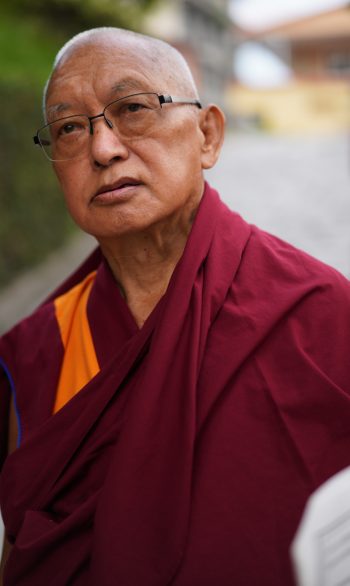
Lama Zopa Rinpoche at Kopan Monastery, Nepal, September 2020. Photo by Ven. Lobsang Sherab.
Lama Zopa Rinpoche continues his video teachings on thought transformation from Kopan Monastery in Nepal. Here is a summary of the most recent teaching:
Rinpoche begins this teaching discussing how millions of people in the West suffer from depression and that some sadly died by suicide. Rinpoche suggests this is because they don’t have meaning in their lives and they haven’t met the teachings of Buddha, so they don’t know how to live life. When one doesn’t have a heart understanding of reincarnation and karma, one doesn’t know that even though the body stops, the mind continues. According to their incomplete knowledge, a depressed person may believe that when they die, they are finished and don’t exist, and therefore, they no longer suffer from their problems. But that is a mistaken view.
Also, if someone has problems with attachment, the self-cherishing mind, anger, and so forth, then spirits can connect with those problems and invade the person’s mind, Rinpoche explains. Then they don’t know that spirits are influencing their thoughts. So you have to question your thoughts and analyze your decisions—ask, “Why am I doing this?” Otherwise there can be danger to yourself; you can become your own enemy. But with analysis and logic, you can help yourself. When you practice Dharma, especially when you practice bodhichitta, you become a guide to yourself, your own guru. Then you can generate the path.
Because of the virus, Rinpoche explains, he has been discussing lojong, thought transformation. Sentient beings experience so much suffering—depression; the suffering of old age, sickness, death, and rebirth; the suffering of not finding a desirable object or finding an undesirable object; and the suffering of change, that what you believe to be pleasure doesn’t last. We think that we stop one suffering and replace it with pleasure, only to have another suffering emerge, and so on. This is called samsaric pleasure. So you need to analyze and understand that what you label “pleasure” comes from your mind and that it is suffering. Desire and craving bind you to samsara. From beginningless rebirths we have been doing this; your attachment and desire have cheated you. Samsaric pleasures cause you to be reborn into oceans of samsaric suffering.
Because our aggregates are totally under the control of karma and delusion, we experience pervasive compounding suffering. And that is why Buddha has shown the four noble truths. Buddha taught how to get rid of the cause of suffering, which is delusion and karma. The teachings of the Buddha—this philosophy, lamrim is its essence—explain this in detail. This is why one must study—not just meditate, but study the teachings.
All the sufferings in the world, including depression, come from the ignorance that believes that the “I” exists from its own side. Since beginningless rebirths, your hallucinated mind has had this mistaken belief of how the “I” exists. Rinpoche then explains the Prasangika view of the object to be refuted, which is an understanding of how the extremely subtle mind relates to the merely labeled “I,” and how it doesn’t exist at all from its own side.
When you recognize the extremely subtle object to be refuted, when you recognize that what you thought existed from its own side is false, Rinpoche explains, the object to be refuted doesn’t go anywhere, but while you are holding it, you recognize that it is not there. For lower intelligence beings, this recognition is a huge shock because they have been believing the wrong view since beginningless rebirths. For higher intelligence bodhisattvas, tears of unbelievable happiness come.
But even if you have the experience of understanding how things truly exist, if you don’t meditate and don’t have realizations, then outside objects control your mind and the experience goes away. This is why you can’t manage when life changes. You aren’t able to practice Dharma, you aren’t able to control your mind, and outside objects control you. The clouds of delusions come and there is so much suffering.
Buddha revealed how to realize emptiness. If you meditate well on dependent arising, your realization of emptiness becomes correct. Everything that exists is merely labeled by the mind because there is a valid base. Therefore, nothing exists from its own side. Many meditators who don’t have the karma and extensive merits to realize this fall into nihilism and think that nothing exists at all.
Rinpoche concludes by explaining that there are extensive benefits to meditating on dependent arising and emptiness.
We invite you to go deeper into the topics presented here, plus many others, by watching Rinpoche’s video and reading the full transcript of Rinpoche’s teaching.
Watch Lama Zopa Rinpoche’s teaching “The Root of All the Suffering in the World Is Ignorance“:
https://youtu.be/wognV3ndrOA
- Read the transcript of Rinpoche’s teaching
- For more from Rinpoche on the object to be refuted, please see Recognizing the False I
- Find Rinpoche’s Teachings on Thought Transformation translated into Spanish, Italian, French, Chinese, and Russian
- Dedication verses for COVID-19 Crisis Teachings
Watch more from the video series Lama Zopa Rinpoche’s Teachings on Thought Transformation during the Time of COVID-19 and find links to videos in transcripts, MP3s, additional practice advice, and more:
https://fpmt.org/fpmt/announcements/resources-for-coronavirus-pandemic/advice-from-lama-zopa-rinpoche-for-coronavirus/
Practice advice from our teachers, Dharma study-from-home opportunities, and more can be found on the page “Resources for the Coronavirus Pandemic.”
Lama Zopa Rinpoche is the spiritual director of the Foundation for the Preservation of Mahayana Tradition (FPMT), a Tibetan Buddhist organization dedicated to the transmission of the Mahayana Buddhist tradition and values worldwide through teaching, meditation and community service.
- Tagged: advice from lama zopa rinpoche, coronavirus, emptiness, lama zopa rinpoche thought transformation video teaching, video
14
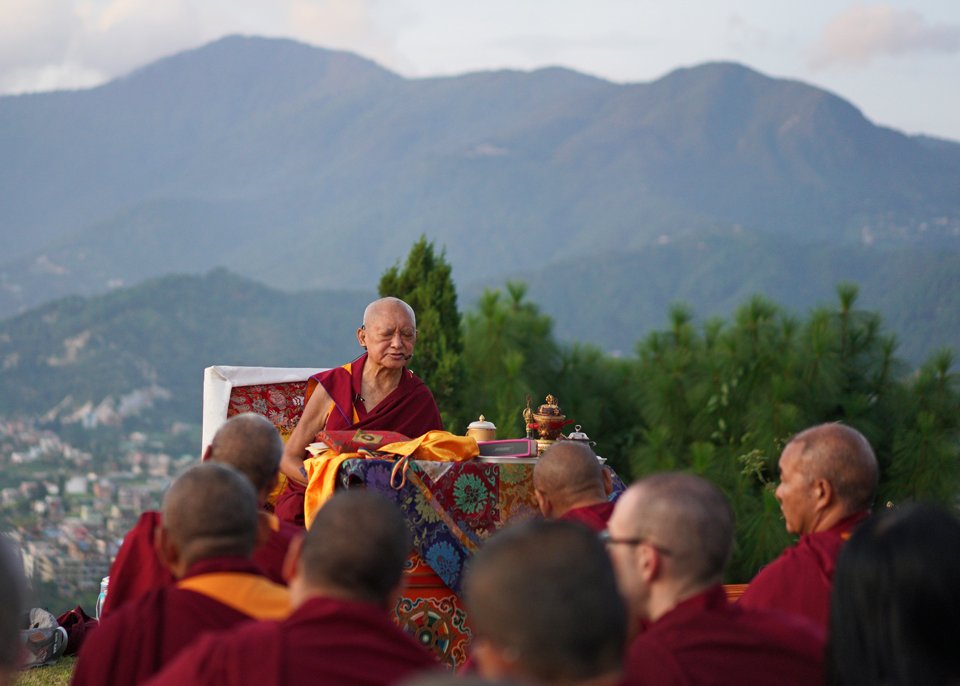
Lama Zopa Rinpoche giving a teaching on chod practice, Kopan Monastery, Nepal, September 2020. Photo by Ven. Lobsang Sherab.
Lama Zopa Rinpoche continues his video teachings on thought transformation from Kopan Monastery in Nepal. Here is a summary of the most recent teaching:
Rinpoche begins this teaching explaining that the Sutra of Great Liberation is exactly what we need to hear now when there is so much danger in the world, including famine, disease, the virus, and so many problems. Just by hearing it, one doesn’t get reborn in the lower realms and it becomes easy to be reborn in a pure land, easy to achieve enlightenment, easy to be free from samsara—there are skies of benefits.
Rinpoche then offers a brief motivation for continuing to listen to the oral transmission of the Sutra of Great Liberation:
The purpose of listening is not just to achieve liberation for oneself. That is not sufficient. It is not the purpose of life as a human being. You must not harm others. You must only benefit and cause happiness for them. There are numberless hungry ghosts, animals, human beings, suras, and asuras. Every single happiness you have experienced since beginningless rebirths comes from them, including every ant you see on the road, mosquito flying around, person you don’t like, person who hates you—yes, even your enemy—every happiness comes from them. Numberless buddhas, Dharma, Sangha—they all came from every hell being, every hungry ghost, every animal, every human being, every sura and asura, every bug that bites you. So who you take refuge in—Buddha, Dharma, and Sangha—they came from every sentient being, so every sentient being is so precious and so kind.
The purpose of listening is to free all sentient beings from the oceans of samsaric sufferings, to bring them to enlightenment—the total cessation of obscurations and the completion of realizations. To do this by yourself alone, you need to achieve the state of omniscience. For this reason, you need to actualize the path, purify obscurations, and collect merits. So therefore, this is why you listen to the teachings, to this oral transmission.
Rinpoche continues the oral transmission and commentary on the Sutra of Great Liberation at 0:08:22 in this video.
We invite you to go deeper into the topics presented here, plus many others, by watching Rinpoche’s video and reading the full transcript of Rinpoche’s teaching.
Watch Lama Zopa Rinpoche’s teaching “Anyone Who Listens to ‘Sutra of Great Liberation’ Gets the Most Unbelievable Merits”:
https://youtu.be/FQZ3kS3SAV8
- Read the transcript of Rinpoche’s teaching
- Find Rinpoche’s Teachings on Thought Transformation translated into Spanish, Italian, French, Chinese, and Russian
- Dedication verses for COVID-19 Crisis Teachings
Watch more from the video series Lama Zopa Rinpoche’s Teachings on Thought Transformation during the Time of COVID-19 and find links to videos in transcripts, MP3s, additional practice advice, and more:
https://fpmt.org/fpmt/announcements/resources-for-coronavirus-pandemic/advice-from-lama-zopa-rinpoche-for-coronavirus/
Practice advice from our teachers, Dharma study-from-home opportunities, and more can be found on the page “Resources for the Coronavirus Pandemic.”
Lama Zopa Rinpoche is the spiritual director of the Foundation for the Preservation of Mahayana Tradition (FPMT), a Tibetan Buddhist organization dedicated to the transmission of the Mahayana Buddhist tradition and values worldwide through teaching, meditation and community service.
- Tagged: advice from lama zopa rinpoche, coronavirus, lama zopa rinpoche thought transformation video teaching, oral transmission, sutra of great liberation, video
12
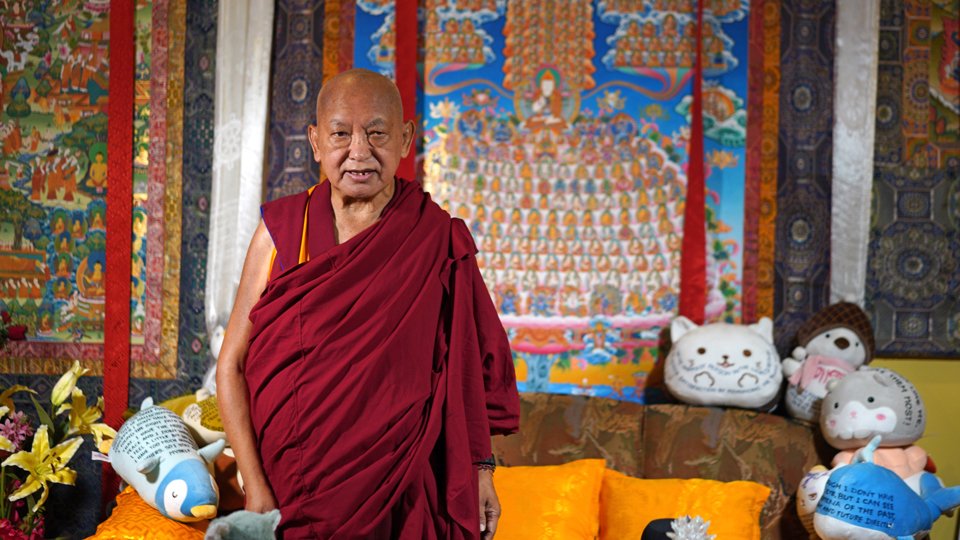
Lama Zopa Rinpoche at Kopan Monastery, Nepal, September 2020. Photo by Ven. Lobsang Sherab.
After a two week pause of giving video teachings, during which time Rinpoche gave teachings to the nuns at Khachoe Ghakyil Ling Nunnery and the monks at Kopan Monastery, Lama Zopa Rinpoche continues with his Teachings on Thought Transformation during the Time of COVID-19 from Kopan Monastery in Nepal. Here is a summary of the most recent teaching:
Lama Zopa Rinpoche begins this teachings discussing how this virus has made it possible for this teaching series to be accessible anywhere in the world. Before, so many resources were spent on the side of Rinpoche and also the students for travel to the teachings. But due to the virus the teachings are made very accessible. Anyone can listen to the recorded teachings anywhere in the world. In this way, unfavorable conditions became a beneficial support.
As His Holiness has explained that when Tibet was lost, it became a condition for the spreading of Dharma in the world, due to His Holiness traveling so extensively. People in so many countries were able to attend His Holiness’ teachings and learn about Buddhism.
The topic of this teaching series has been lojong, thought transformation. The whole lamrim is lojong, but there is also “lamrim lojong,” specific practices given in the lamrim teachings.
Rinpoche explains that so far the focus of his teachings in this series has been the foundation of lojong, the foundational teaching of how to realize emptiness by utilizing unfavorable and miserable conditions on the path to enlightenment. And also how even when you are happy, you can make that experience useful to achieve enlightenment.
By hearing about subjects that are the foundation of lojong—such as impermanence and death, renunciation, the preciousness of life, the opportunity of a perfect human rebirth, and so forth—this gives you energy and courage to practice. Rinpoche explains that all of these fundamental teachings become a commentary on this verse from Shanitdeva’s Bodhicharyavatara (v. 5.17):
“If someone doesn’t know the supreme principal Dharma,
The secrecy of the mind,
Even if they desire to achieve happiness and eliminate suffering,
They will wander without purpose in samsara.”
Rinpoche explains that, according to a commentary by Gyaltshab Je, “secrecy of the mind” does not refer to emptiness but to the motivations of the three capable beings—lower capable beings, middle capable beings, and higher capable beings. That motivation is holy Dharma. It is not worldly Dharma, Rinpoche emphasizes, but holy Dharma.
If you don’t have a Dharma motivation, no matter how much you desire to achieve happiness and eliminate suffering, day and night, you are constantly creating nonvirtue with your body, speech, and mind. If you have a human body but you do not have a good heart, then you are no different than an animal looking only for what they want to make themselves happy without the thought of benefiting others. A person can have a degree from the University of Oxford or Harvard University, but if someone harms them and they harm back then that way of thinking is no different than the thinking of mosquitoes, snakes, or tigers.
Without knowing and practicing the secrecy of the mind, without having a holy Dharma motivation, even if you know the whole Kangyur and Tengyur by heart, you won’t make progress. Not thinking of benefiting sentient beings has kept us wandering in samsara since beginningless rebirths. Seeking happiness for the self-cherishing thought has kept us trapped in the lower realms and samsara.
Then Rinpoche continues with the oral transmission and commentary of the Sutra of Great Liberation. Rinpoche first gives instruction on the correct motivation for listening to the oral transmission and commentary.
The purpose of life is not to just avoid the lower realms and receive a higher rebirth, or to be free from the oceans of samsaric suffering forever. The main purpose of life is to achieve full enlightenment, buddhahood, the total cessation of gross and subtle obscurations and the completion of realizations, for all sentient beings. This is for every single sentient being—including every hell being; every hungry ghost; every animal such as tiny insects, dogs, goats, birds, etc.; every single human being including those speaking different languages in different countries, those who are your enemy, friends, or strangers, those who are your parents, brothers, sisters; and every sura and asura. Your purpose is to free them from the oceans of samsaric sufferings and bring them to enlightenment, to buddhahood, by yourself alone. Therefore, you are listening to the teachings, listening to the oral transmission of Sutra of Great Liberation, for this purpose.
The world is so full of problems, including contagious diseases, wars, fighting, and disasters of the elements such as landslides, typhoons, tornadoes, and fires. The Sutra of Great Liberation is exactly what you need at this dangerous time. (The oral transmission begins at 0:41:16 in the video.)
We invite you to go deeper into the topics presented here, plus many others, by watching Rinpoche’s video and reading the full transcript of Rinpoche’s teaching.
Watch Lama Zopa Rinpoche’s teaching “‘Sutra of Great Liberation’ Is Exactly What Is Needed at This Dangerous Time”:
https://youtu.be/bszHIss9wF0
- Read the transcript of Rinpoche’s teaching
- Find Rinpoche’s Teachings on Thought Transformation translated into Spanish, Italian, French, Chinese, and Russian.
- Dedication verses for COVID-19 Crisis Teachings
Watch more from the video series Lama Zopa Rinpoche’s Teachings on Thought Transformation during the Time of COVID-19 and find links to videos in transcripts, MP3s, additional practice advice, and more:
https://fpmt.org/fpmt/announcements/resources-for-coronavirus-pandemic/advice-from-lama-zopa-rinpoche-for-coronavirus/
Practice advice from our teachers, Dharma study-from-home opportunities, and more can be found on the page “Resources for the Coronavirus Pandemic.”
Lama Zopa Rinpoche is the spiritual director of the Foundation for the Preservation of Mahayana Tradition (FPMT), a Tibetan Buddhist organization dedicated to the transmission of the Mahayana Buddhist tradition and values worldwide through teaching, meditation and community service.
- Tagged: advice from lama zopa rinpoche, coronavirus, lama zopa rinpoche thought transformation video teaching, oral transmission, sutra of great liberation, video
7
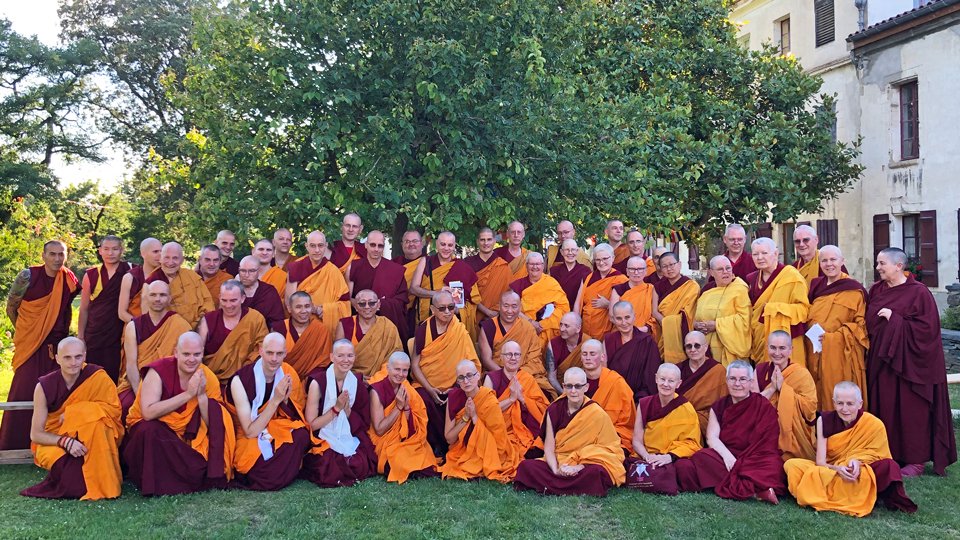
Lama Zopa Rinpoche with Sangha and newly ordained Sangha, Nalanda Monastery, France, June 2019. Photo by Ven. Lobsang Sherab.
Lama Zopa Rinpoche often highlights the importance of ordained Sangha along with the importance of Sangha in the West. Here’s an excerpt from Rinpoche teaching on this topic at Maitreya Instituut in The Netherlands in 2015:
From the side of the monk and the nun in the West, it is an unbelievable practice to dedicate onself to living in one’s ordination vows; it is great, great, great. It takes great courage, it is a great challenge, but it is so worthwhile.
Being Sangha in the West, being an ordained person in the West, is a billion times better than being in the Olympics. I must say it loudly! I must announce it loudly! It’s a billion, zillion, trillion times better than the Olympics or the World Cup. The world thinks that those things are so important, but it’s like a one-year-old baby playing, you understand? When I was a child in Solu Khumbu, where there is water and sand to play with, I would build something and say, “That is my house.” And some other children would destroy it, then I would cry, “Oh, my house!” Looking at the reality of life from the Dharma point of view, the Olympics and the World Cup are like child’s play.
In the West, when you win at the Olympics or World Cup you become famous in the world, you become like a god to young people; after you win at soccer the young people take you to be like a god.
Being ordained in the West, a monk and nun who is practicing—not ordained for political reasons or changing just the outside, or to get money, for example—really practicing Dharma, keeping the vows, whether it is for your own ultimate happiness, liberation, or for others who are numberless, is a billion, zillion, trillion times more important challenge than the Olympics or World Cup.
In reality it is like this, you understand?
The laypeople—and the Sangha themselves—must know that the Sangha practicing in the West are great champions. They are like an army going towards the enemy, who are carrying swords, carrying all the weapons to destroy them. They run towards the enemy to overcome them—the oceans of samsaric sufferings of the hells, the oceans of suffering of human beings, the oceans of suffering of the suras, the preta beings, asuras, animals.
Even living in vows just for yourself, for your own happiness, ultimate happiness—without even talking about enlightenment for sentient beings—you must realize you are a champion, a champion, you should realize that. You are a billion, zillion, trillion, numberless times more of a champioin than those who win the Olympics or World Cup; you must know that, feel that.
It is very, very important for the ordained Sangha to be strong in their Dharma practice; your mind practicing Dharma has to be strong—especially when lay people don’t appreciate it. That is how to enjoy life as Sangha.
It’s the same for lay people who are doing retreat and practicing Dharma, but especially for the Sangha. They are living in ordination in order to defeat delusions, you understand? To defeat delusions, the cause of samsara, to overcome them. It’s a huge difference, wow, wow, wow. You understand? You have to see the difference. The Sangha lead a very simple life, in a dedicated way, very renounced, in order to overcome delusion; what he or she practices is this.
We have been suffering from beginningless rebirths, beginningless rebirths, you understand? Suffering in the oceans of hell realms, human beings, six realms without beginning, can you imagine? The ordained Sangha, their practice is to overcome the causes of samsara, delusions and karma, you understand? You have to know that.
If people—the Sangha and lay people—just think that Sangha are simply changing from lay dress to Sangha dress, cutting the hair and changing the robe, then life has no meaning. You have to know why you become Sangha, you have to remember that. That is why I said the Olympics is nothing; all the things that worldly people think are so huge are nothing; they’re just child’s play. By following those you’re just being a servant to delusion, a total slave to delusion.
You have to understand that having met the Dharma and practicing Dharma—for lay people but especially Sangha—is a big, huge decision in life. Wow, wow, wow! It is not just a simple thing.
Colophon: Lama Zopa Rinpoche teaching on respect for Sangha in the West, at Maitreya Instituut, The Netherlands, July 15–16, 2015. Edited by Ven. Robina Courtin, August 19, 2020. Lightly edited for publication on FPMT.org
Watch the video series “Lama Zopa Rinpoche’s Teachings on Thought Transformation during the Time of COVID-19” and find links to videos in translation, transcripts, MP3s, additional practice advice, and more:
https://fpmt.org/fpmt/announcements/resources-for-coronavirus-pandemic/advice-from-lama-zopa-rinpoche-for-coronavirus/
Learn more about the nuns and monks of FPMT:
https://fpmt.org/centers/sangha/
Lama Zopa Rinpoche is the spiritual director of the Foundation for the Preservation of Mahayana Tradition (FPMT), a Tibetan Buddhist organization dedicated to the transmission of the Mahayana Buddhist tradition and values worldwide through teaching, meditation and community service.
- Tagged: advice from lama zopa rinpoche, anger, lama zopa rinpoche, lama zopa rinpoche advice for sangha, sangha, supporting sangha
5
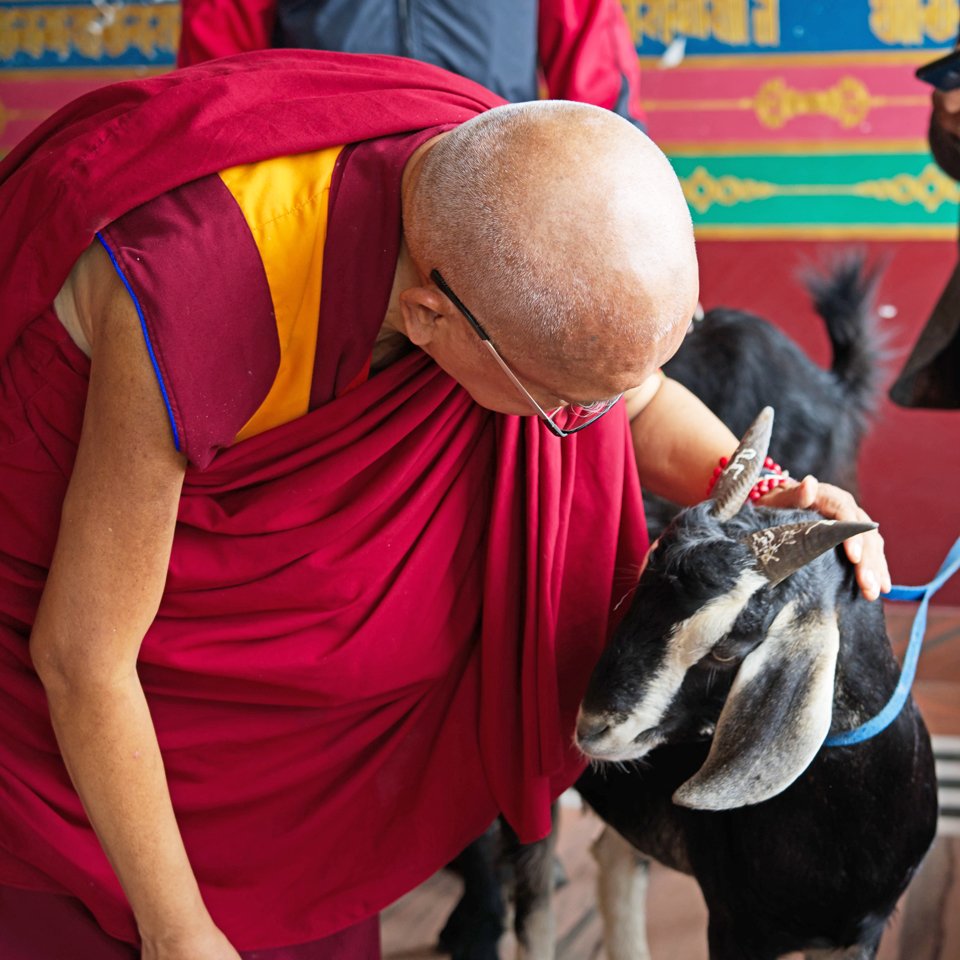
Rinpoche blessing and reciting mantras for two goats that had just been saved from the butcher and now live at the Animal Liberation Sanctuary, Khachoe Ghakyil Ling (Kopan Nunnery), July 2020. Photo by Ven. Lobsang Sherab.
Patience: A Guide to Shantideva’s Sixth Chapter is a new book of Lama Zopa Rinpoche’s teachings on the perfection of patience, a topic Rinpoche has taught on extensively. (Perhaps this is not surprising since Rinpoche’s name “Zopa” means “patience.”) In this book, recently released by Wisdom Publications, Rinpoche gives commentary on the verses on patience in Shantideva’s A Guide to the Bodhisattva’s Way of Life. Here’s an excerpt from the chapter “When We Respect Sentient Beings, We Respect the Buddhas”:
Compassion for all sentient beings with the exception of one—the one we consider our enemy—is not great compassion, and without great compassion bodhichitta and enlightenment are impossible. Great compassion entails not only the wish for all sentient beings to be free from all suffering but also the determination that we ourselves will free them. This great compassion therefore relies on each and every sentient being: every hell being, hungry ghost, animal, human, demigod, god, and intermediate-state being. It includes our friends and those we consider strangers, but it also includes our enemies.
Shantideva compared the “field” of sentient beings to a buddha field. Because farmers rely on their fields of crops to earn their living, they take very good care of them—watering them, fertilizing them, protecting them from frost, and so forth. They think their crops are extremely precious. In exactly the same way, if we use the field of sentient beings to plant the thoughts of loving-kindness, compassion, and bodhichitta, we reap the crop of full enlightenment.
When we understand that all sentient beings are the field from which we receive all happiness, up to and including enlightenment, we will naturally want to take the best possible care of them, serving them in whatever way is best to repay their kindness. Even if we must give up our life—even if we must give up our life numberless times—there is still no way we can repay that kindness.
At present, we respect the Buddha, Dharma, and Sangha and make offerings to them, because it is through relying on their guidance that we can attain enlightenment. When we understand that we equally need to rely on all sentient beings to obtain buddhahood, through practicing the six perfections with them, we will see that we should also respect and make offerings to them in the same way we do with the Three Rare Sublime Ones. Of course, the buddhas’ qualities are inexpressible and their intentions for us are unimaginable, and this is certainly not so for sentient beings. But, as Shantideva said, even though they are not equal in their qualities, they are equal in the results we obtain from them, so why do we not equally revere them?
To attain bodhichitta, we need to create an immense amount of merit through practices such as making offerings to holy objects. How could we make such offerings if it weren’t for sentient beings? Even a tiny stick of incense or a few grains of rice have come from the work of others. When we fly above a great city at night and see the millions of lights, these are an excellent offering to the buddhas, but who created all those lights? Sentient beings. If there were no sentient beings, there would be nothing to offer the buddhas. And there would be no buddhas, because they became buddhas by relying on the field of sentient beings.
Sentient beings are the foundation of our practice of generosity and morality, the cause of this perfect human rebirth. They are the foundation of our entire happiness, including enlightenment. They are our merit field, allowing us to create infinite merit by serving them. In that way, they are so kind. We cannot point to one sentient being who is kinder than any other. The whole path depends on all sentient beings. Paying respect to sentient beings is the same as paying respect to the buddhas and bodhisattvas. If we help sentient beings, that is the best offering to the buddhas and bodhisattvas. If we take care of sentient beings, we take care of the buddhas and bodhisattvas.
When we work for sentient beings, we work for the buddhas and bodhisattvas, because that is all that they are ever doing. There is not one flea, one mosquito, one hell being, one god, one spirit that all buddhas and bodhisattvas, with their infinite wisdom and compassion, are not ceaselessly and tirelessly working for. When we save the life of that flea, we are doing the work of a buddha. When we cherish that angry person, we are doing the work of a buddha, because that is what the buddhas and bodhisattvas do. They cherish every being more than themselves. If we are unable to do that yet, by aspiring to and working toward that, we are pleasing all the buddhas and bodhisattvas.
Regardless of whether a sentient being loves us, we should sincerely wish them happiness from our heart, with a mind like clear water, unhindered by attachment or other emotional minds that cloud it. With such an attitude, no matter what they do to us, that mind of lovingkindness and compassion does not budge. The deep peace we get from them is something we couldn’t get from all the wealth in the world.
Excerpted from Patience: A Guide to Shantideva’s Sixth Chapter by Lama Zopa Rinpoche, edited by Gordon McDougall, published by Wisdom Publications (WisdomExperience.org).
Watch the video series “Lama Zopa Rinpoche’s Teachings on Thought Transformation during the Time of COVID-19” and find links to videos in translation, transcripts, MP3s, additional practice advice, and more:
https://fpmt.org/fpmt/announcements/resources-for-coronavirus-pandemic/advice-from-lama-zopa-rinpoche-for-coronavirus/
Lama Zopa Rinpoche is the spiritual director of the Foundation for the Preservation of Mahayana Tradition (FPMT), a Tibetan Buddhist organization dedicated to the transmission of the Mahayana Buddhist tradition and values worldwide through teaching, meditation and community service.
- Tagged: a guide to the bodhisattva's way of life, advice from lama zopa rinpoche, anger, lama zopa rinpoche, patience, shantideva, wisdom publications
2
Practice Now Because You Can Die Anytime!
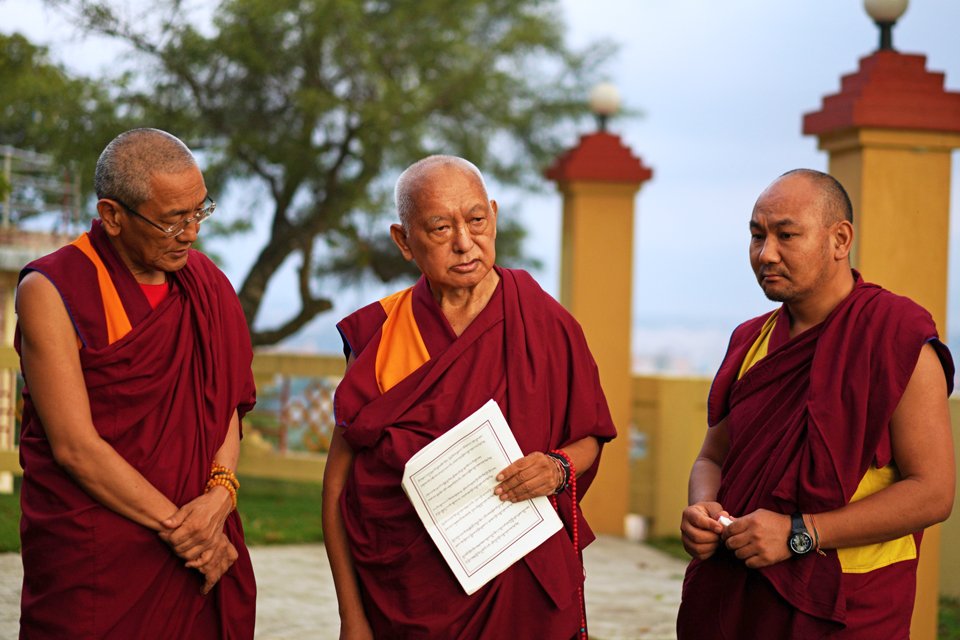
Lama Zopa Rinpoche walking around the stupas and gardens with Khen Rinpoche Geshe Chonyi and Ven. Thubten Tendar at Kopan Monastery, Nepal, September 2020. Photo by Ven. Lobsang Sherab.
Lama Zopa Rinpoche continues his video teachings on thought transformation from Kopan Monastery in Nepal. Here is a summary of the most recent teaching:
Lama Zopa Rinpoche begins this teaching explaining that Buddhism teaches us that how things appear to our minds is totally opposite to how they exist. Every single thing we do in our lives with our body, speech, and minds is carried forth with this wrong view, which is a total hallucination. What this basic Buddhist teaching offers you is the opportunity to learn about the truth of your life. Buddhism is not just chanting and learning rituals; it is for discovering yourself.
When you believe what your anger thinks, Rinpoche explains, you want to destroy your enemy. You believe that what ignorance says is true. It is the same with attachment. You get stuck on an object and believe, “this is soooo good.” In reality, there is nothing there; it is empty. What anger believes, what attachment believes, is not really there. Both anger and attachment are built on the basis of a wrong view of the object.
Every single word Buddha taught is to subdue the mind, Rinpoche reminds us. The way to do that is by meditating on death and impermanence. This destroys the concept of permanence, which makes anger, attachment, and all problems arise. Remembering death and impermanence is also the basis for lojong (thought transformation). You can die at anytime, so it’s best to practice now!
Rinpoche then shares a motivation for listening to the teaching and receiving the continued oral transmission of The Heart’s Utmost Need. He reminds us that our purpose should be to benefit, and not harm, others. Our purpose should be to free numberless sentient beings from oceans of samsaric suffering forever, to bring them to peerless happiness, the total cessation of obscurations, gross and subtle, and then to the completion of all realizations. To achieve that, one must achieve omniscience and actualize the graduated path to enlightenment. Therefore, think, For that purpose, I will listen to the teachings for every single being. You have to really think of the beings, even a tiny insect in front of you. You are listening for them.
Rinpoche then continues offering the oral transmission and commentary of The Heart’s Utmost Need (beginning at 0:18:15 in the video).
Please note that the dedication verses have recently been updated and the latest version (below) should be used.
We invite you to go deeper into the topics presented here, plus many others, by watching Rinpoche’s video and reading the full transcript of Rinpoche’s teaching.
Watch Lama Zopa Rinpoche’s teaching “Practice Now Because You Can Die Anytime!“:
https://youtu.be/7IvgibbO4jk
- Read the transcript of Rinpoche’s teaching
- The Heart’s Utmost Need: Persuading Oneself and Others to Remember Impermanence and Death by Phabonghka Rinpoche
- Dedication verses for COVID-19 Crisis Teachings (Update September 22, 2020)
Watch more from the video series Lama Zopa Rinpoche’s Teachings on Thought Transformation during the Time of COVID-19 and find links to videos in translation, transcripts, MP3s, additional practice advice, and more:
https://fpmt.org/fpmt/announcements/resources-for-coronavirus-pandemic/advice-from-lama-zopa-rinpoche-for-coronavirus/
Practice advice from our teachers, Dharma study-from-home opportunities, and more can be found on the page “Resources for the Coronavirus Pandemic.”
Lama Zopa Rinpoche is the spiritual director of the Foundation for the Preservation of Mahayana Tradition (FPMT), a Tibetan Buddhist organization dedicated to the transmission of the Mahayana Buddhist tradition and values worldwide through teaching, meditation and community service.
- Tagged: advice from lama zopa rinpoche, coronavirus, heart spoon, impermanence and death, lama zopa rinpoche thought transformation video teaching, oral transmission, video
1
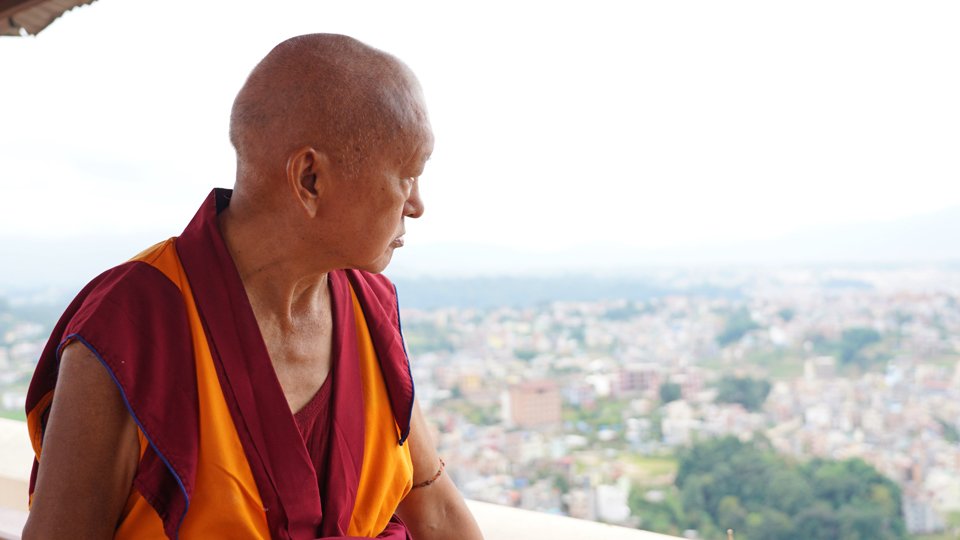
Lama Zopa Rinpoche looking at the view from Kopan Monastery, Nepal, September 2020. Photo by Ven. Lobsang Sherab.
Patience: A Guide to Shantideva’s Sixth Chapter is a new book of Lama Zopa Rinpoche’s teachings on the perfection of patience, a topic Rinpoche has taught on extensively. (Perhaps this is not surprising since Rinpoche’s name “Zopa” means “patience.”) In this book, recently released by Wisdom Publications, Rinpoche gives commentary on the verses on patience in Shantideva’s A Guide to the Bodhisattva’s Way of Life. Here’s an excerpt from the chapter “The Kindness of the Enemy:”
The traditional way for Tibetans and Sherpas to make the soles of shoes was to soften the leather using butter. Because of the stiffness of untreated leather, it could only be cut or sewn with great difficulty. Therefore it was soaked in the butter left over from butter lamps and kneaded while drying in the sun, and polished to make it soft and malleable but still extremely strong. The kneading was a bit like kneading dough, working with the feet, pulling and pushing, until it became softer. When I was very small, my first teacher who taught me the alphabet would sometimes do this while he gave me a lesson or I was reciting a text. It takes a lot of physical energy.
With the butter, the sun, and the kneading, the leather becomes workable; without them the leather would be so stiff it would be useless. Similarly, our “untreated” mind—when we are not living in patience— is stiff and useless. We need patience, and we need other sentient beings to allow us to develop that patience. The harm that somebody tries to do us, testing our patience, is like the stiff leather of our pride being kneaded. By helping us destroy our delusions like that, they are saving us from the lower realms.
In the thought-transformation text Eight Verses on Mind Training, Langri Tangpa said,
Even if one whom I have helped,
Or in whom I have placed great hope,
Gravely mistreats me in hurtful ways,
I will train myself to view him as my sublime teacher.
When Atisha was in Tibet, he had a servant, Atara, who was very bad tempered and who always caused other people to get angry. When asked why he kept him, Atisha explained that he did so in order to practice patience, for without patience you could not become a great yogi. It is very useful to think like this.
We can view any situation from many perspectives. Rather than seeing somebody who is giving us harm as the cause of our suffering, we can see them as the means for our transformation, as the embodiment of our guru, thinking that our guru has manifested in this way in order for us to develop our patience. As enlightenment is impossible without the perfection of patience, it is impossible without this person trying to harm us and thereby testing our patience. Thinking like that, we see there is no reason to become angry in return. Techniques like this make the mind malleable and able to transform more quickly. This is another benefit of patience.
Excerpted from Patience: A Guide to Shantideva’s Sixth Chapter by Lama Zopa Rinpoche, edited by Gordon McDougall, published by Wisdom Publications:
https://wisdomexperience.org/product/patience/
Watch the video series “Lama Zopa Rinpoche’s Teachings on Thought Transformation during the Time of COVID-19” and find links to videos in translation, transcripts, MP3s, additional practice advice, and more:
https://fpmt.org/fpmt/announcements/resources-for-coronavirus-pandemic/advice-from-lama-zopa-rinpoche-for-coronavirus/
Lama Zopa Rinpoche is the spiritual director of the Foundation for the Preservation of Mahayana Tradition (FPMT), a Tibetan Buddhist organization dedicated to the transmission of the Mahayana Buddhist tradition and values worldwide through teaching, meditation and community service.
- Tagged: a guide to the bodhisattva's way of life, advice from lama zopa rinpoche, anger, lama zopa rinpoche, patience, shantideva, wisdom publications
28
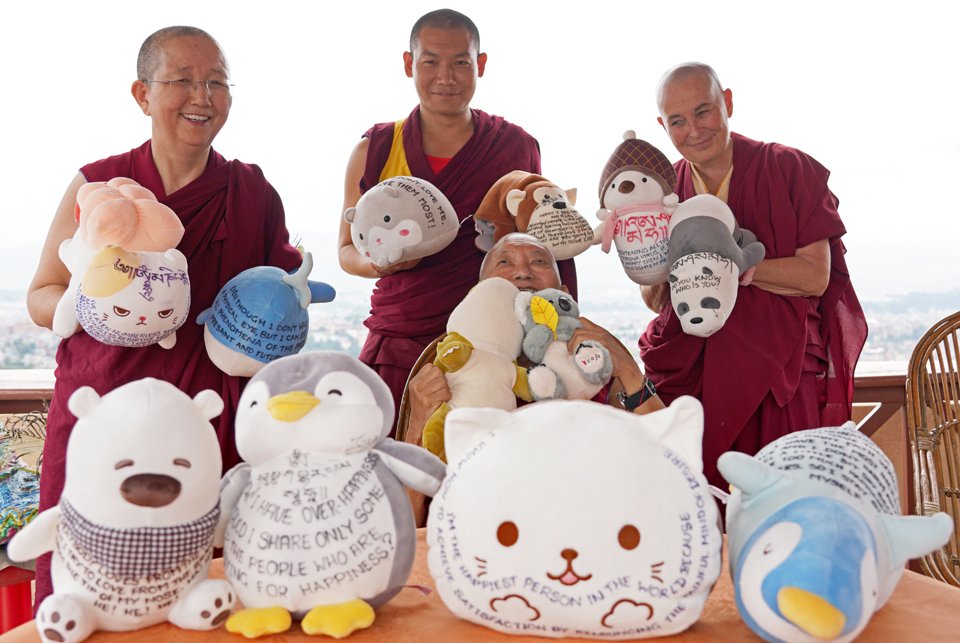
Lama Zopa Rinpoche, with Vens. Tsenla, Topgye, and Tenzin, and stuffed toys with mantras and Dharma messages written upon them, Kopan Monastery, Nepal, September 2020. Photo by Ven. Lobsang Sherab.
Lama Zopa Rinpoche gave this advice to a student in November 2016.
When you have very negative thoughts, thinking that “Nobody loves me, no one cares for me,” and so on, you have so much unhappiness that is made by your own mind. You have had that very unhappy mind for a long time. You think that the numberless buddhas and bodhisattvas don’t love you, they don’t care for you; that you are completely left out, that they let you suffer. This shows that you don’t have renunciation. You have no renunciation of attachment, nor bodhichitta or emptiness.
Actually the buddhas and bodhisattvas cherish you one hundred thousand times more than you love yourself. If they did not love you and cherish you, then you would not be a human being this time, not even that. All these virtues could not be done and so much benefit to sentient beings would not happen, you would not have all this Dharma education and so forth. So much, so much, so much.
It is important to understand that those who are living in renunciation—the meditators, monks, nuns, and also lay people—have inner peace and happiness. Renunciation means to renounce attachment to this life, to future lives, to samsara. They don’t feel that “Nobody loves me.” They are satisfied because they have inner peace and happiness. The stronger the renunciation, the more peace and happiness inside. Many people do not know this and they think that bringing presents, flowers, and cakes makes them sooooo happy.
Generating the two bodhichittas, loving kindness and compassion, is not attachment. Just as a mother cherishes her child, in this way the meditator cherishes all sentient beings—numberless hell beings, preta beings, animals, humans, suras, asuras, and intermediate state beings—and generates the precious thought to achieve full enlightenment for all mother sentient beings. From this there are skies of happiness and peace.
This is very important news, which can be very helpful for many other people, students, and general people. The sadness, feeling alone, that no one loves you, comes from attachment to this life. That’s why we need renunciation. This is the antidote to bring inner peace and happiness. It means the mind will become pure Dharma.
Drogön Tsangpa Gyare, who is the savior of transmigratory beings, said:
“We must not lose the auspicious connection with the valid perfect one. Even if we lose auspicious connection with everyone else, let it happen. But if we lose the connection with the valid perfect one, then even if all transmigratory beings become our relatives, what is the use of that?”
This advice “The Buddhas and Bodhisattvas Cherish You” was originally published in “Lama Zopa Rinpoche’s Online Advice Book” on the Lama Yeshe Wisdom Archive website:
https://lamayeshe.com/advice/buddhas-and-bodhisattvas-cherish-you
Watch the video series Lama Zopa Rinpoche’s Teachings on Thought Transformation during the Time of COVID-19 and find links to videos in translation, transcripts, MP3s, additional practice advice, and more:
https://fpmt.org/fpmt/announcements/resources-for-coronavirus-pandemic/advice-from-lama-zopa-rinpoche-for-coronavirus/
Lama Zopa Rinpoche is the spiritual director of the Foundation for the Preservation of Mahayana Tradition (FPMT), a Tibetan Buddhist organization dedicated to the transmission of the Mahayana Buddhist tradition and values worldwide through teaching, meditation and community service.
- Tagged: advice from lama zopa rinpoche
23
What to Do When This Happens to You?
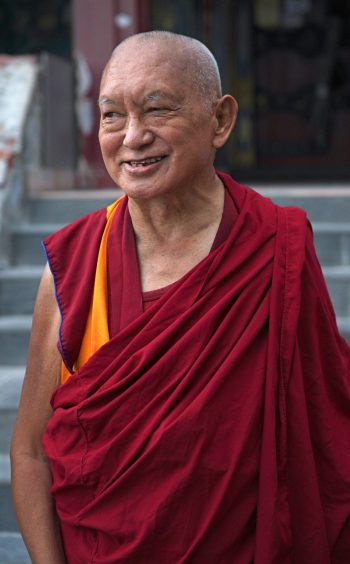
Lama Zopa Rinpoche at Kopan Monastery, September 2020. Photo by Ven. Lobsang Sherab.
Lama Zopa Rinpoche continues his video teachings on thought transformation from Kopan Monastery in Nepal. Here is a summary of the most recent teaching:
Rinpoche begins this teaching explaining that the reason why we practice lojong (thought transformation) is to utilize all undesirable situations—sickness, misfortunes, etc.—on the path to enlightenment.
Rinpoche explains a quote from Serlingpa, one of Lama Atisha’s two root gurus, to illustrate his point. The quote, from Serlingpa’s Leveling Out All Conceptions, says:
Unfavorable conditions are virtuous friends.
Spirit possessions are manifestations of the Victorious One.
Sicknesses are brooms for cleaning negative karmas and obscurations.
Sufferings are displays of the ultimate nature.
Suffering is a manifestation of emptiness, Rinpoche explains. By meditating on suffering you realize that the ultimate nature of suffering is emptiness, a dependent arising.
Rinpoche then continues the oral transmission of The Heart’s Utmost Need (at 0:07:28 in the video). Rinpoche reminds us that the motivation for listening to a teaching or receiving an oral transmission is to free numberless sentient beings from the oceans of samsaric sufferings, and not only that, but to bring numberless beings—meaning everyone—to enlightenment.
Therefore, we should think, I must achieve enlightenment for all beings. This is the motivation for listening to the teachings: to achieve enlightenment in order to liberate others.
We invite you to go deeper into the topics presented here, plus many others, by watching Rinpoche’s video and reading the full transcript of Rinpoche’s teaching.
Watch Lama Zopa Rinpoche’s teaching “What to Do When This Happens to You?“:
https://youtu.be/YqCT292CNp8
- Read the transcript of Rinpoche’s teaching
- The Heart’s Utmost Need: Persuading Oneself and Others to Remember Impermanence and Death by Phabonghka Rinpoche
- Dedication verses for COVID-19 Crisis Teachings
Watch more from the video series Lama Zopa Rinpoche’s Teachings on Thought Transformation during the Time of COVID-19 and find links to videos in translation, transcripts, MP3s, additional practice advice, and more:
https://fpmt.org/fpmt/announcements/resources-for-coronavirus-pandemic/advice-from-lama-zopa-rinpoche-for-coronavirus/
Practice advice from our teachers, Dharma study-from-home opportunities, and more can be found on the page “Resources for the Coronavirus Pandemic.”
Lama Zopa Rinpoche is the spiritual director of the Foundation for the Preservation of Mahayana Tradition (FPMT), a Tibetan Buddhist organization dedicated to the transmission of the Mahayana Buddhist tradition and values worldwide through teaching, meditation and community service.
- Tagged: advice from lama zopa rinpoche, coronavirus, heart spoon, lama zopa rinpoche thought transformation video teaching, oral transmission, video
19
This Is Going to Happen to You!
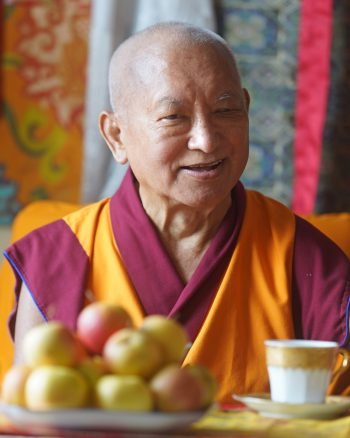
Lama Zopa Rinpoche, Kopan Monastery, Nepal, September 2020. Photo by Ven. Lobsang Sherab.
Lama Zopa Rinpoche continues his video teachings on thought transformation from Kopan Monastery in Nepal. Here is a summary of the most recent teaching:
Rinpoche begins by explaining that although this teaching series has been labeled Rinpoche’s “thought transformation” teachings, all 84,000 teachings of Buddha are to subdue, benefit, and transform the mind, like a doctor giving a prescription for a rock-hard mind that is habituated to suffering.
Rinpoche discusses the nine-round meditation on impermanence and death, and the importance of doing this practice of visualizing what happens to your body after your own death.
Rinpoche also explains the prayers he does when he goes around Swayambhunath mountain in Nepal and past the cemetery there. Rinpoche says he makes prayers to the Seven Medicine Buddhas that any person who has had there dead body taken there—in the past, present, and future—never be reborn in the lower realms but be born in a pure land where they can become enlightened or at least receive a perfect human rebirth, meet the Mahayana teachings, meet a perfectly qualified Mahayana guru revealing the unmistaken path to enlightenment, and then, by pleasing most the holy mind of the virtuous friend, be enlightened quickly.
Rinpoche also reminds us of the importance of remembering that today your body is here but tomorrow your body could be the one on the cemetery fire. Therefore, meditating on impermanence subdues the mind and makes it soft.
Rinpoche then gives a motivational teaching for receiving the continuation of the oral transmission of The Heart’s Utmost Need. Rinpoche tells a story to illustrate how our motivation needs to be pure Dharma and not based in the eight worldly dharmas. He also tells a story about his time in the refuge camp in Buxa Duar, listening to the breath of a monk who was dying.
Every single word of Buddha’s teachings is for every single sentient being, Rinpoche reminds us. We must keep that in mind every time we listen to the teachings. Even sentient beings who we hate, who are our enemies, who look down on us and harm us, we listen to the teachings for them—for every single sentient being in numberless universes.
Rinpoche then continues offering the oral transmission and commentary of The Heart’s Utmost Need, which he received from Kyabje Ribur Rinpoche. (The oral transmission begins at 53:09 in the video.)
We invite you to go deeper into the topics presented here, plus many others, by watching Rinpoche’s video and reading the full transcript of Rinpoche’s teaching.
Watch Lama Zopa Rinpoche’s teaching “This Is Going to Happen to You!”:
https://youtu.be/7mtAZg9_6m0
- Read the transcript of Rinpoche’s teaching
- The Heart’s Utmost Need: Persuading Oneself and Others to Remember Impermanence and Death by Phabonghka Rinpoche (previously known as Heart Spoon)
- Dedication verses for COVID-19 Crisis Teachings
Watch more from the video series Lama Zopa Rinpoche’s Teachings on Thought Transformation during the Time of COVID-19 and find links to videos in translation, transcripts, MP3s, additional practice advice, and more:
https://fpmt.org/fpmt/announcements/resources-for-coronavirus-pandemic/advice-from-lama-zopa-rinpoche-for-coronavirus/
Practice advice from our teachers, Dharma study-from-home opportunities, and more can be found on the page “Resources for the Coronavirus Pandemic.”
Lama Zopa Rinpoche is the spiritual director of the Foundation for the Preservation of Mahayana Tradition (FPMT), a Tibetan Buddhist organization dedicated to the transmission of the Mahayana Buddhist tradition and values worldwide through teaching, meditation and community service.
- Tagged: advice from lama zopa rinpoche, buxa duar, coronavirus, heart spoon, impermanence and death, lama zopa rinpoche thought transformation video teaching, video
14
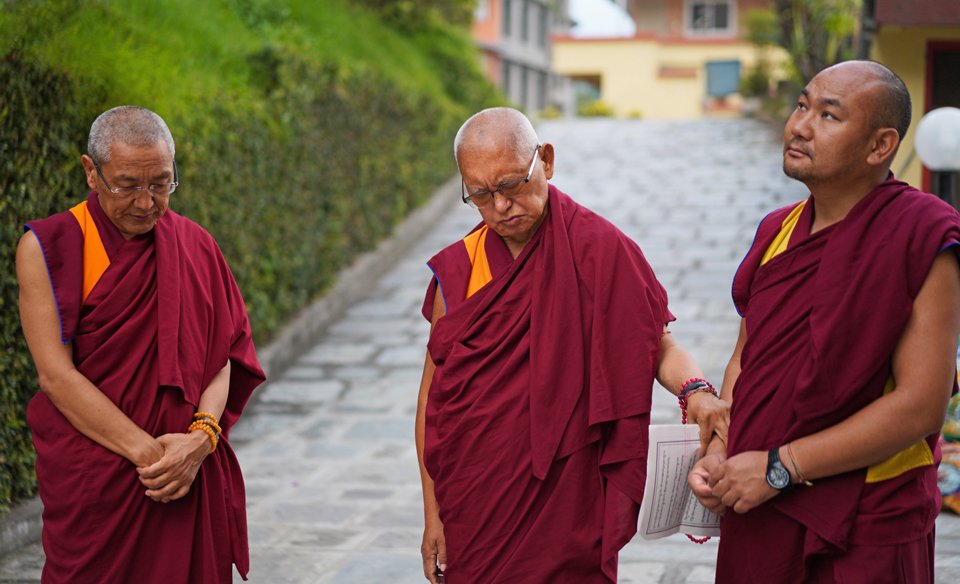
Khen Rinpoche Geshe Chonyi with Lama Zopa Rinpoche and Ven. Thubten Tendar, Kopan Monastery, Nepal, September 2020. Photo by Ven. Lobsang Sherab.
Lama Zopa Rinpoche continues his video teachings on thought transformation from Kopan Monastery in Nepal. Here is a summary of the most recent teaching:
Rinpoche begins this teaching explaining that the whole lamrim, the graduated path to enlightenment, is about thought transformation. Rinpoche goes through a broad outline of lamrim topics and discusses how each are for training in thought transformation, including guru devotion, perfect human rebirth, death and impermanence, refuge and karma, samsara is the nature of suffering, compassion for others, and bodhichitta.
Rinpoche further explains that bodhichitta is only “between the lips” if you don’t meditate on your own suffering, and if you don’t see that your own samsara is in the nature of suffering, your compassion will be limited.
Rinpoche then begins offering the lung (oral transmission) and commentary on The Heart’s Utmost Need (formerly known as Heart Spoon, at 0:13:30 in the video). The full lung is not completed in this teaching.
Rinpoche then explains that meditating on death and impermanence is the best medicine for all mental problems. Additionally, every single word Buddha taught was to help subdue the mind. When the mind is not subdued, all suffering—including that of the hell realms, hungry ghosts, and animals—comes from the mind.
We invite you to go deeper into the topics presented here, plus many others, by watching Rinpoche’s video and reading the full transcript of Rinpoche’s teaching.
Watch Lama Zopa Rinpoche’s teaching “Meditating on Impermanence-Death Is the Best Medicine for All Mental Problems”:
https://youtu.be/06v4Nc_j6vo
- Read the transcript of Rinpoche’s teaching
- Find more resources on lamrim study
- The Heart’s Utmost Need: Persuading Oneself and Others to Remember Impermanence and Death by Phabonghka Rinpoche (previously known as Heart Spoon)
- Dedication verses for COVID-19 Crisis Teachings
Watch more from the video series Lama Zopa Rinpoche’s Teachings on Thought Transformation during the Time of COVID-19 and find links to videos in translation, transcripts, MP3s, additional practice advice, and more:
https://fpmt.org/fpmt/announcements/resources-for-coronavirus-pandemic/advice-from-lama-zopa-rinpoche-for-coronavirus/
Practice advice from our teachers, Dharma study-from-home opportunities, and more can be found on the page “Resources for the Coronavirus Pandemic.”
Lama Zopa Rinpoche is the spiritual director of the Foundation for the Preservation of Mahayana Tradition (FPMT), a Tibetan Buddhist organization dedicated to the transmission of the Mahayana Buddhist tradition and values worldwide through teaching, meditation and community service.
- Home
- News/Media
- Study & Practice
- About FPMT Education Services
- Latest News
- Programs
- New to Buddhism?
- Buddhist Mind Science: Activating Your Potential
- Heart Advice for Death and Dying
- Discovering Buddhism
- Living in the Path
- Exploring Buddhism
- FPMT Basic Program
- FPMT Masters Program
- FPMT In-Depth Meditation Training
- Maitripa College
- Lotsawa Rinchen Zangpo Translator Program
- Universal Education for Compassion & Wisdom
- Online Learning Center
- Prayers & Practice Materials
- Overview of Prayers & Practices
- Full Catalogue of Prayers & Practice Materials
- Explore Popular Topics
- Benefiting Animals
- Chenrezig Resources
- Death & Dying Resources
- Lama Chopa (Guru Puja)
- Lama Zopa Rinpoche: Compendium of Precious Instructions
- Lama Zopa Rinpoche: Life Practice Advice
- Lama Zopa Rinpoche Practice Series
- Lamrim Resources
- Mantras
- Prayer Book Updates
- Purification Practices
- Sutras
- Thought Transformation (Lojong)
- Audio Materials
- Dharma Dates – Tibetan Calendar
- Translation Services
- Publishing Services
- Teachings and Advice
- Find Teachings and Advice
- Lama Zopa Rinpoche Advice Page
- Lama Zopa Rinpoche: Compendium of Precious Instructions
- Lama Zopa Rinpoche Video Teachings
- ༧སྐྱབས་རྗེ་བཟོད་པ་རིན་པོ་ཆེ་མཆོག་ནས་སྩལ་བའི་བཀའ་སློབ་བརྙན་འཕྲིན།
- Podcasts
- Lama Yeshe Wisdom Archive
- Buddhism FAQ
- Dharma for Young People
- Resources on Holy Objects
- Ways to Offer Support
- Centers
- Affiliates Area
- Teachers
- Projects
- Charitable Projects
- Make a Donation
- Applying for Grants
- News about Projects
- Other Projects within FPMT
- Support International Office
- Projects Photo Galleries
- Give Where Most Needed
- FPMT
- Shop
Translate*
*powered by Google TranslateTranslation of pages on fpmt.org is performed by Google Translate, a third party service which FPMT has no control over. The service provides automated computer translations that are only an approximation of the websites' original content. The translations should not be considered exact and only used as a rough guide.I encourage people not to express their anger, not to let it out. Instead, I have people try to understand why they get angry, what causes it and how it arises. When you realize these things, instead of manifesting externally, your anger digests itself. In the West, some people believe that you get rid of your anger by expressing it, that you finish it by letting it out. Actually, in this case what happens is that you leave an imprint in your mind to get angry again.









